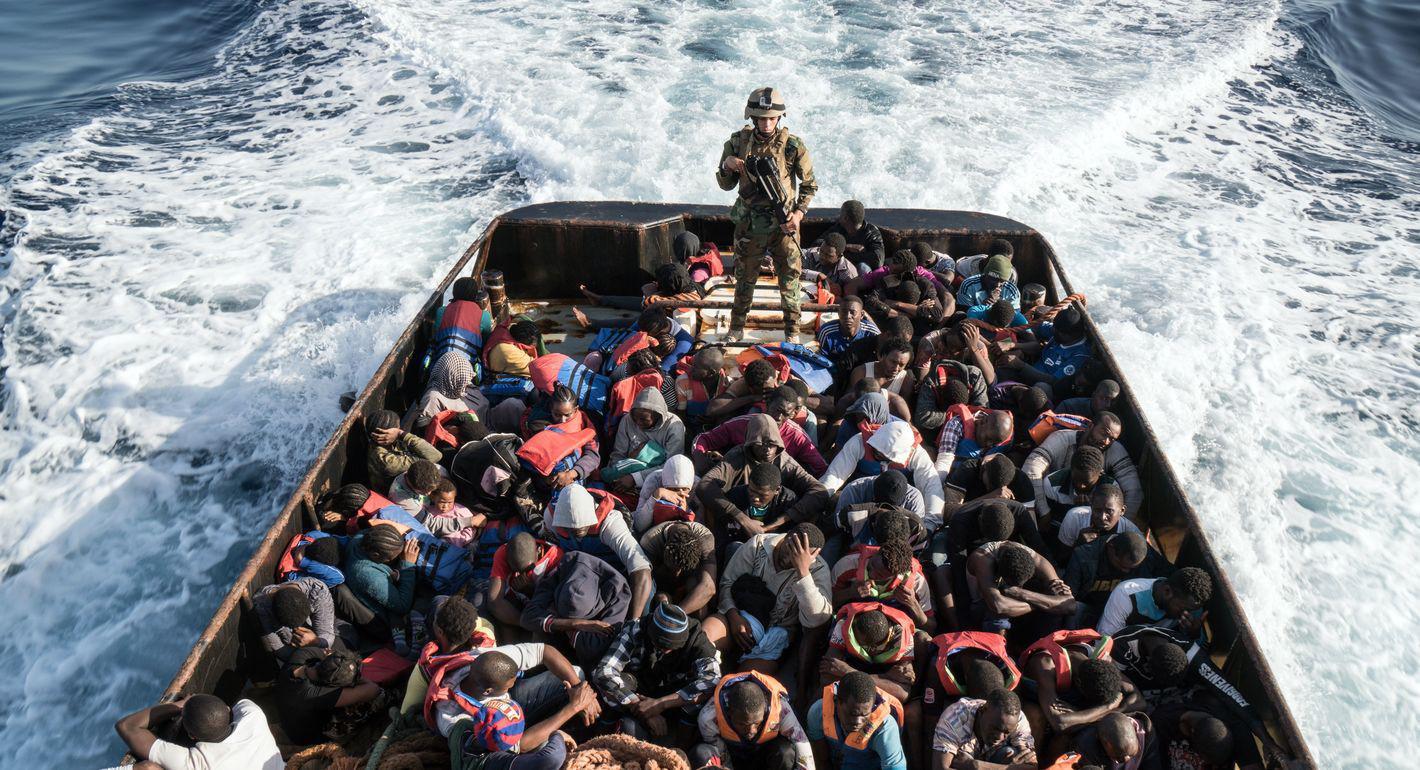{
"authors": [
"Pierre Boussel"
],
"type": "commentary",
"blog": "Sada",
"centerAffiliationAll": "dc",
"centers": [
"Carnegie Endowment for International Peace"
],
"collections": [],
"englishNewsletterAll": "menaTransitions",
"nonEnglishNewsletterAll": "",
"primaryCenter": "Carnegie Endowment for International Peace",
"programAffiliation": "MEP",
"programs": [
"Middle East"
],
"projects": [],
"regions": [],
"topics": []
}
Source: Getty
The War Against Human Traffickers in Libya
Following reports of widespread migrant exploitation, Libyan authorities in both Tripoli and Tobruk are conducting a deliberate effort to crack down on smuggling.
Alarming reports from international organizations are having little effect on the deterioration of living conditions for over 700,000 migrants in Libya. While many hope to reach the European Union, crossing the Mediterranean is deadly: nearly 2,000 have died or disappeared at sea since the beginning of the year. This July, Syrians on one clandestine boat begged the captain to turn back when the vessel began to leak, despite risking arrest by the Libyan coastguard. The latter has stepped up patrols to such an extent that some migrants are turned back up to ten times before reaching Europe.
Once arrested, migrants are transferred by the Libyan Directorate for Combating Illegal Migration (DCIM) to detention centers such as Bir Ghanam, Gharyan, Ayn Zarah, Tarik al-Sikka and Al Mabani. Cases of torture and sexual abuse are regularly reported by NGOs, and United Nations investigators have found that some migrants, driven to despair, commit suicide by hanging or drinking shampoo. Families of migrants sometimes pay bribes of up to $5000 to secure their release from detention.
In March 2023, a UN fact-finding mission claimed that migrant exploitation in Libya was in violation of international law, with evidence that both armed militias and state actors had committed crimes against humanity. The report pointed to the fact that the “the smuggling, trafficking, enslavement, forced labour, imprisonment, and extortion of migrants generated significant revenue for individuals, armed groups, and State institutions,” including Libyan state entities that receive significant EU funding to combat irregular migration.
While the EU has denied that it helps smugglers in Libya, the Libyan authorities—both the internationally-recognized government in Tripoli, and the Tobruk-based government in the east—have launched new initiatives to try to combat smuggling and convey a responsible migration policy.
Most migrants in Libya come from sub-Saharan Africa, but in the east, there is additional pressure from the Egyptian border, through which Bangladeshis, Pakistanis, and other Asian migrants transit. On land, local forces are carrying out operations to demolish smuggling warehouses; at sea, there have been reports of migrant pullbacks led by the Tariq Ben Zeyad Brigade, a militia led by Saddam Haftar, the son of Libyan National Army commander Khalifa Haftar. Despite its lack of international recognition, Haftar’s regime may be taking these anti-smuggling measures in part to access European funding.
The authorities in Tripoli, on the other hand, have employed legal proceedings in order to distinguish themselves from Tobruk. The Libyan Attorney General's office recently announced the conviction of thirty-eight traffickers who had sent eleven migrants to their deaths in an ill-fated boat. But Tripoli has also resorted to force in the crackdown on smuggling: in May, the government launched military operations in the western Zawiya region to dismantle illegal migrant camps controlled by traffickers. According to reports, drone strikes destroyed “seven migrant smuggling boats, six drug smuggling depots and nine fuel smuggling tankers.” The Tripoli authorities have also taken measures to escort migrants back to their countries of origin, and to expel hundreds of Egyptians, Chadians and Sudanese to third countries, such as Rwanda or Gambia.
It remains to be seen whether these initiatives will convince Libya's partners—the UN, the EU, the African Union, and the US. They, too, face a challenging diplomatic balance: pressuring Libyan officials in both the east and the west to respect human rights, without undermining government initiatives.
But in the face of regional crises, it is certain that Libya’s authorities will continue to be tested. The ongoing conflict in neighboring Sudan has pushed large numbers of refugees to try to cross the border. Neither the Sudanese nor the Libyan authorities know how many have died attempting the journey, and many of those who survived are now trapped in limbo. As long as it remains divided, Libya will be ill-equipped to cope with these sudden and unexpected migrant arrivals—giving smugglers the upper hand.
Pierre Boussel is an associate researcher at the Foundation for Strategic Research (FRS), with a focus on the Arab world and Islamist extremism. Based in North Africa since 1999, his research and analysis have been published by public policy centers in Europe, the United States, and the Gulf.
About the Author
Pierre Boussel
Carnegie does not take institutional positions on public policy issues; the views represented herein are those of the author(s) and do not necessarily reflect the views of Carnegie, its staff, or its trustees.
